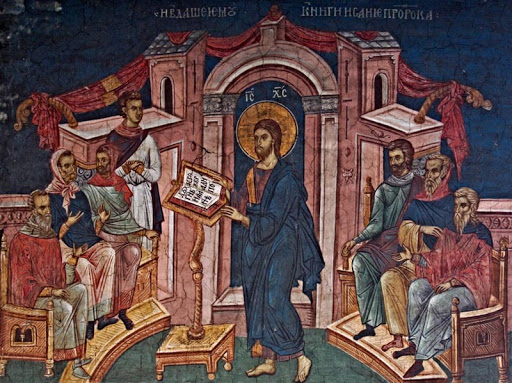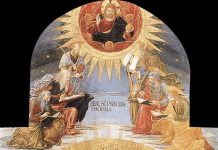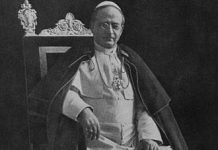The New Testament is concealed in the Old and the Old Testament is revealed in the New. This longstanding Church principle highlights how so much of what is written in the Old Testaments points us to Jesus Christ though it was written well before Our Lord came to this earth.1
Our first reading today is an example of an Old Testament passage that is eventually fulfilled in Christ. In it we hear God speaking through the prophet Isaiah, as He says “…so shall my word be that goes out from my mouth; it shall not return to me empty, but it shall accomplish that which I purpose, and succeed in the thing for which I sent it” (55.11).
The word flowing from God’s mouth that fulfills His holy will is Jesus Himself, for as it says in the Gospel of John, “[i]n the beginning was the Word and the Word was with God, and the Word was God….And the Word became flesh and lived among us” (1.1,14a). Clearly, Jesus was sent by the Father to draw all people everywhere to a deep and enduring relationship with our One, loving God who is three Persons: Father, Son, and Holy Spirit. Furthermore, Jesus sends each one of us out into the world, often our local communities, to share the kingdom of God with others through our words and deeds (see Jn 20.21b).
We know that sharing and proclaiming the kingdom to others so they may know the Risen Lord Jesus occurs in a variety of different ways. It includes praying for others at Holy Mass as well as through powerful devotions such as the Rosary. It includes service to the vulnerable through organizations such as a Right to Life Centre, the Euthanasia Prevention Coalition, St. Vincent de Paul, the Catholic Women’s League, the Knights of Columbus, a local food bank. And it includes inviting others to Mass, to Eucharistic Adoration, or to a church-based social gathering.
All of these methods – prayer, service, and invitation – align with what Jesus teaches us in the Gospel reading today (Mt 13.1-23) when He says “[o]ther seeds fell on good soil and brought forth grain, some a hundredfold, some sixty, some thirty” (v.8). These seeds refer to God’s love and will for us and the good soil are those blessed persons who faithfully follow the Lord and share the Good News with others. This is what you and I are called to do and engaging in sacred acts of prayer, service, and invitation like those delineated above can bring forth much fruit, much growth in the kingdom of God (v.23)!
And yet we know the Evil one is promoting many movements and lies to keep people from Jesus and to weaken our commitment to being His disciples. Jesus also points this out in today’s Gospel reading, as the seeds on the path ate up by birds represent those people who hear the Good News but don’t seem to care and the saving Truth, which is snatched away from them by Satan. The seeds sown on rocky ground highlight those who initially say “yes” to the Lord but end up abandoning Him once things get difficult, such as experiencing persecution. And the seeds sown among thorns depict those whose call to discipleship is crowded out by earthly temptations to acquire much power and riches (Mt 13.3b-7, 19-22).
Clearly, we must aspire to be good soil so that we bear an abundance of fruit for our loving God. This means we cultivate our relationship with Him through prayer, the sacraments, and reading the Sacred Scriptures. Other forms of spiritual reading, such as the writings of various saints, can also be a tremendous spiritual benefit.
When we consider our prayer lives, it can be especially fruitful to prayerfully ponder the beautiful dimensions of our Catholic-Christian beliefs and in our second reading today St. Paul outlines an awesome one – the restoration of all of creation when the Risen Lord Jesus comes again to judge the living and the dead.2 To help us grasp the magnitude of this wondrous event, let us briefly review chapter 3 of the Book of Genesis.
Genesis 3 describes how our original parents, Adam and Eve, disobeyed God by eating fruit from the tree of the knowledge of good and evil. This was the original sin that has distorted our relationship with God ever since. And as God said to Adam in v. 17 “…cursed is the ground because of you: in toil you shall eat of it all the days of your life.” In other words, creation itself, the entire universe, has been subject to decay and destruction because of Adam and Eve’s rebellion against God.3
So, when we think about all the various disasters that plague humanity – earthquakes, floods, hurricanes and so forth – this all stems back to the dawn of creation in which human sin not only corrupted human beings but the entire universe. However, all is not lost, for as we hear St. Paul say today “creation itself will be set free from its bondage to decay and will obtain the freedom of the glory of the children of God” (Rom 8:21).
This is a wondrous passage for it indicates that on the Last Day, on the day of the Resurrection of the Dead and when Christ comes for the Final Judgement, the universe itself will be transformed and there will be no more decay. No more sin, no more death, no more disease, earthquakes or floods. All of the universe will share in the glory of Our Risen Lord Jesus Christ. Thus, the form of this world, which has been distorted by sin, is fading away. And God is preparing a new Heaven and a new Earth in which ongoing peace will dwell; all saved human beings will share in the perfect happiness of the risen and glorified Jesus.4
This description of our ultimate call and destiny is beautiful indeed and definitely worth praying over. Such a description nourishes our love and commitment to the Risen Lord and to spreading the Good News of the kingdom. It helps us to be “good soil.”
And as we prayerfully strive for eternal salvation and await the renewal and restoration of all things, let us celebrate those smaller-scale renewals in our lives that we know come from God. Examples are finding a lost object after praying for the intercession of St. Anthony, receiving financial assistance in an unexpected away after praying to God for help, and experiencing Our Lord’s mercy through the Sacrament of Confession. Returning to a state of grace after falling into mortal sin makes us feel “reborn” in the spiritual sense as it restores our relationship with God, the Church, and creation!
As it is often said, “God is good all the time and all the time God is good!”5 So, let us generously share the Gospel through our words and actions and strive to bear much fruit, no matter what struggles and resistance we may face from others and from ourselves. We know it is not always easy to share the Gospel but it is ultimately joyful as “the sufferings of this present time are not worth comparing with the glory about to be revealed to us” (Rom 8:18).
Sources
1 Source: https://bccatholic.ca/voices/fr-vincent-hawkswell/the-new-testament-lies-hidden-in-the-old (Retrieved July 11th, 2023).
2 Catechism of the Catholic Church. 1047.
3 Ignatius Catholic Study Bible – New Testament, p. 268.
4 Brant Pitre, The Mass Readings Explained: Fifteenth Sunday in Ordinary Time: Year A (Part one), pp. 6-7.
5 Source: https://www.umcdiscipleship.org/resources/god-is-good-all-the-time (Retrieved July 11th, 2023).












